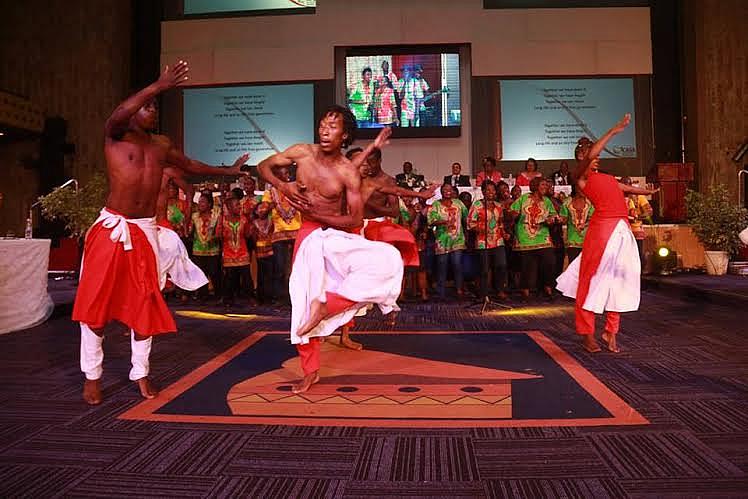Young people fight HIV through dance

HIV prevalence has remained a problem among young people across the globe.
The 9th edition of Jibilika Dance Festival used the platform of edutainment to strengthen and systematize knowledge and best practices in the use of creativity and artistic expression in HIV and AIDS education as well as developing youth friendly tools and materials.
In Zimbabwe At least 80 000 girls between the ages of 15 and 24 are currently living with HIV while 36 000 males of the same age are also living with the virus according to National Aids Council Statistics .
According to United Nations International Children's Emergency Fund (UNICEF) in 2014, about 2.0 million adolescents between the ages of 10 and 19 were living with HIV worldwide.
Adolescents account for about 5 per cent of all people living with HIV and about 12 per cent of new adult HIV infections and Regions with the highest numbers of HIV-positive adolescents are sub-Saharan Africa and South Asia.
Of the 2.0 million adolescents living with HIV, about 1.6 million (82 per cent) live in sub-Saharan Africa.
Founder of Jibilika Dance Festival, Plot Mhako said they are taking the platform of dance to spread a positive social message to young people.
“Young people have been embraced with a lot of challenges for example high rates of employment which has resulted in them abusing drugs and making them vulnerable to HIV,” says Mhako.
He added that better understanding and protection of young people’s rights is needed.
“This dance festival has created and provided coverage of services at a greater point of view leading to more informed and empowered young people as highlighted by the festivals theme ‘Empowered’.
It’s the best way to increase understanding of their particular vulnerabilities to HIV in order to develop effective strategies addressing their specific needs.,” added Mhako saying that they are dedicated to acknowledging ,appreciating ,exposing and impacting talented performance from Zimbabwe to the world at large .
AfricAid Zvandiri, Communications Officer Tinashe Rufurwadzo said that HIV positive youths have the right to choose the kind of dreams they wish to pursue in life.
“As an Organisation we have been voicing to stop stigma and resurrect love.
It is disheartening that some people are still shattering other people dreams and careers because of HIV. Being positive is not the end of the world,” Rufurwadzo said.
He added that such platforms as Jibilika Dance festivals have ensured that everyone has adequate levels of knowledge and skills on both Sexual Reproductive Health Rights (SRHR) and HIV.
“We have made a huge impact by dancing, edutainment and giving a voice to fight HIV.
The success of both HIV and reproductive health programmes depends on changing human sexual behaviour thus we have been doing through this platform,” he said.
Rufurwadzo added that AfricAid Zvandiri has assisted 5000 youths across Zimbabwe in intergrating different kinds of operational programmes to ensure collective outcomes among youths.
“The main goal is to have a collective outcome and this has been successful in offering comprehensive services to youths like HIV testing and counselling, male circumcision and Anti-Retroviral Therapy (ART) services and access to a lot of tailored service ” he added.
Organisation for public health interventions and development (OPHID) Advocacy and communications manager Loveness Mlambo Chimombe said the Ministry of Health and Child Care and OPHID has unveiled the treat All program.
“There is no more waiting to get on treatment for anyone who tests HIV positive.
OPHID’s Families and Communities for the Elimination of HIV (FACE HIV) is leading the early implementation of the Treat All initiative, with support from the U.S President’s Emergency Plan For AIDS Relief (PEPFAR) through the United States Agency for International Development (USAID),”said Chimombe.
She added that all Hospitals, Clinics and Rural Health Centres in four districts of Manicaland province.
“Mutare, Mutasa, Makoni and Chipinge districts now offer HIV Care and Treatment services to all People Living with HIV, encouraging them to get in care, start taking their Antiretroviral medicines and adhere to treatment.
People living with HIV who have stopped taking ARVs are being encouraged to come back to care,” said Chimombe.
She cited that that everyone newly diagnosed HIV positive, anyone who is HIV positive and has been in Pre-ART care , everyone with a confirmed HIV positive status but never been in Pre-ART care, and not yet on ART, everyone who has been on ART before and stopped taking the HIV treatment should visit nearest clinics for treatment.
